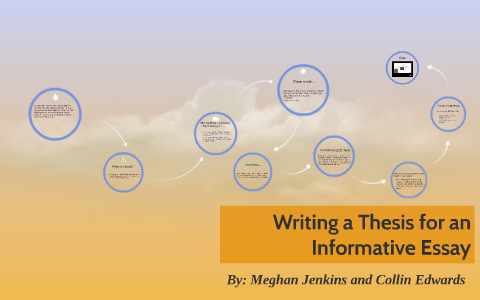How to Write a Thesis Statement for an Informative Essay

Thesis statements should promise your readers something. Your reader is likely to trust you more if you provide solid evidence for your claims. They are also important because they’re an arguable proposition, not simply factual statements. In other words, a good thesis statement is an argument based on research. In this piece, you’ll explain what you’ve learned and cited. If you’re unsure of how to write a thesis statement, here are some basic steps to follow:
Good thesis statements are arguable not factual
A good thesis statement for an informative essay must be argumentative and debatable. Statements of fact, on the other hand, are easy to argue against, and don’t allow you to show critical thinking or analytical skills. Instead, a good thesis statement for an informative essay takes a position and explains why you believe that particular opinion. Listed below are some examples of good thesis statements for an informative essay.
A good thesis statement for an informative essay is one that asserts a point and is supported by logical facts. Moreover, a good thesis statement will contain an opposing viewpoint, also called a counterargument. Using a counterargument in a paper helps in securing an audience’s agreement. However, a good thesis statement should be concise and argumentative.
They are a promise to the reader
The thesis statement in an informative essay is a claim or promise to the reader. It should be a complete sentence and indicate what the essay will do: provide evidence to support the assertion or answer the main question of the essay. It may be one or more sentences and may vary by type of paper. It should not be discussed in the first paragraph, so it is important to think about the length of the statement.
When writing an informative essay, it’s helpful to think about what topics your paper will focus on. For example, an expository “process” essay shouldn’t have a thesis statement that contains a paragraph or two about the author’s favorite book. Similarly, a descriptive paper shouldn’t include references to other parts of the neighborhood or house.
They are based on your research
An informative essay follows the typical structure of an essay. It starts with an introduction, three body paragraphs, and a conclusion. Your research should fit into these three sections, so sort it into three different categories. For example, a piece on eating disorders might fall under the categories of causes, effects, and recovery. Then, the conclusion of your essay should restate the main idea of the essay.
A thesis statement for an informative essay is one sentence in which you state what you want to achieve by the conclusion of your essay. Your thesis statement should be clear, concise, and related to the topic or argument of your paper. In addition, it should be written in proper diction, which means that it should be clear and straightforward. Do not use big, vague words. Also, be careful not to use flowery language in your thesis statement, as this will only confuse your reader.
They include supporting evidence
Informing readers of your topic is one of the most important facets of your essay. The introduction should begin with an informative thesis statement that states the point you are trying to make and leads the reader to that conclusion. Every paragraph should link the thesis statement to its claim. Make sure your thesis statement is based on a point with supporting evidence. If you feel you need to add more evidence to your thesis statement, do so.
The body of an informative essay should follow a systematic structure and contain a thesis statement. The thesis statement presents the overall idea of the paper. It is often found at the end of the introduction. The information in the body should be logically organized and related to the thesis statement. The transition between paragraphs should be smooth. The topic sentence in each body paragraph should support the idea of the thesis statement.
